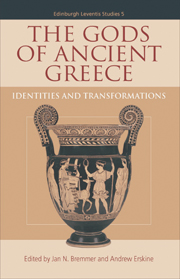Book contents
- Frontmatter
- Contents
- Preface
- List of Illustrations
- Notes on Contributors
- List of Abbreviations
- Introduction: The Greek Gods in the Twentieth Century
- 1 What is a Greek God?
- PART I SYSTEMATIC ASPECTS
- 2 Canonizing the Pantheon: the Dodekatheon in Greek Religion and its Origins
- 3 Gods in Greek Inscriptions: Some Methodological Questions
- 4 Metamorphoses of Gods into Animals and Humans
- 5 Sacrificing to the Gods: Ancient Evidence and Modern Interpretations
- 6 Getting in Contact: Concepts of Human–Divine Encounter in Classical Greek Art
- 7 New Statues for Old Gods
- PART II INDIVIDUAL DIVINITIES AND HEROES
- PART III DIACHRONIC ASPECTS
- PART IV HISTORIOGRAPHY
- Epilogue
- Index
7 - New Statues for Old Gods
from PART I - SYSTEMATIC ASPECTS
Published online by Cambridge University Press: 05 August 2013
- Frontmatter
- Contents
- Preface
- List of Illustrations
- Notes on Contributors
- List of Abbreviations
- Introduction: The Greek Gods in the Twentieth Century
- 1 What is a Greek God?
- PART I SYSTEMATIC ASPECTS
- 2 Canonizing the Pantheon: the Dodekatheon in Greek Religion and its Origins
- 3 Gods in Greek Inscriptions: Some Methodological Questions
- 4 Metamorphoses of Gods into Animals and Humans
- 5 Sacrificing to the Gods: Ancient Evidence and Modern Interpretations
- 6 Getting in Contact: Concepts of Human–Divine Encounter in Classical Greek Art
- 7 New Statues for Old Gods
- PART II INDIVIDUAL DIVINITIES AND HEROES
- PART III DIACHRONIC ASPECTS
- PART IV HISTORIOGRAPHY
- Epilogue
- Index
Summary
According to the third-century AD Cilician poet and biographer of philosophers, Diogenes Laertius, Stilpo of Megara was run out of Athens in the late fourth century BC for insulting the city's patron goddess:
He used the following argument concerning Pheidias' Athena: ‘Isn't Athena, the daughter of Zeus, a god?’ And when the other said ‘Yes’ he went on, ‘But she isn't Zeus’, but Pheidias'.’ When the other agreed, he concluded, ‘So she isn't a god.’ And for this he was summoned before the Areopagos.
There, he attempted to defend himself, ingeniously arguing that Athena was no god, but rather a goddess – a female rather than a male. But the Areopagites would have none of it. All of which, Diogenes concludes, led the atheist Theodoros of Cyrene to remark sarcastically, ‘How did Stilpo learn that? Did he lift her garment and contemplate her garden?’
(Life of Stilpo 2.116)The garment of Pheidias' Athena was made of gold, over a ton of it, but this last insult, apparently, did not concern the Areopagites. At issue, despite Stilpo's attempted diversion through grammatical analysis, was the relation of the image to the imaged, and Stilpo's affront to the former had to be punished to restore honour to the latter. (Theodoros, in contrast, apparently escaped with impunity.)
- Type
- Chapter
- Information
- The Gods of Ancient GreeceIdentities and Transformations, pp. 126 - 152Publisher: Edinburgh University PressPrint publication year: 2010



